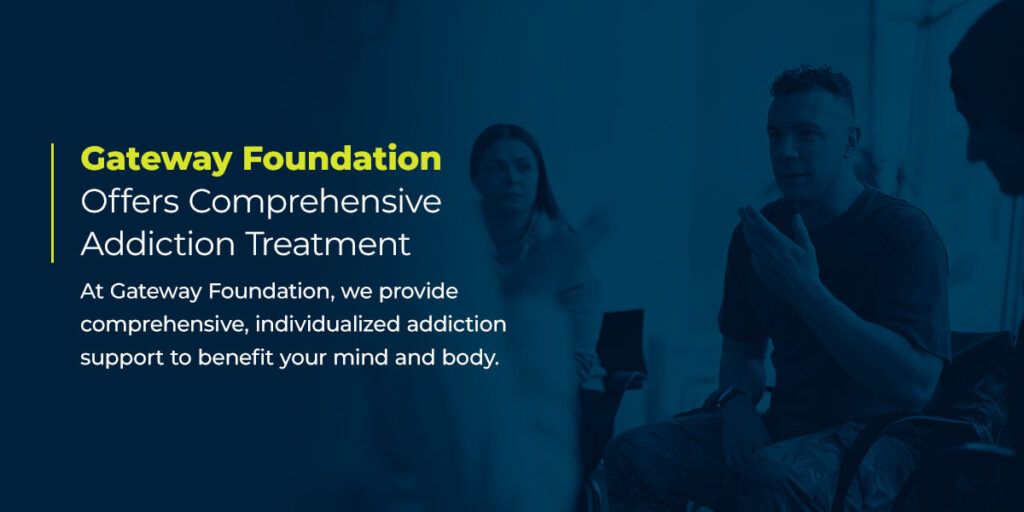- Apr 19
- Addiction

Addiction can have an immense impact on your physical health. Depending on the substance and severity, addiction can weaken your immune system and make you more vulnerable to illness, infection, and disease. It can also lead to health complications and put a person at risk of unintentional injuries and accidents. That’s why treatment programs address all aspects of a person’s addiction — including nutrition, exercise, and healthy activities — to strengthen physical health.
If you or someone you know is struggling, recognizing how addiction affects health can help you decide when to seek help.
How Substance Addiction Weakens The Body
While addiction impacts a person’s finances, relationships, career, and mental health, substances can also significantly weaken the body. While the impact of addiction can vary depending on the substance, quantity, and frequency of use, any substance addiction can impact almost every organ in the body. These changes can be short- or long-term and can even lead to irreversible damage.
Here’s how addiction leads to illness and complications:
Causes Inflammation
Excessive alcohol use causes inflammation throughout the body. When this occurs, red blood cells attach to each other in harmful ways. These red cells clog smaller blood vessels, decreasing oxygen and nutrient flow and preventing your immune system from receiving the nutrients it needs to function.
Additionally, a study on rats found that opioid withdrawal can suppress certain anti-inflammatory bacteria in the gut, causing inflammation in the digestive system. Opioid withdrawal was also shown to cause inflammation in certain parts of the brain, which may be linked to the negative emotional experience associated with withdrawal.
Affects the Cardiovascular System
Some substances lower heart rates, such as opioids, while others can cause heart attacks or collapsed veins. Heroin and injected substances increase the risk of heart infections, while cocaine increases the risk of stroke or heart attack. Alcohol addiction also impacts the cardiovascular system, causing high blood pressure and heart failure. Excessive drinking can also lead to cardiomyopathy, a disorder that reduces the heart’s ability to deliver blood throughout the body.
Places Strain on the Liver
Substance use disorder can immensely impact your liver, increasing the risk of liver damage and failure. Alcohol can damage liver cells, while drugs like heroin, steroids, and inhalants can cause hepatitis, fatty liver disease, and jaundice. When misused, painkillers can lead to liver injuries, particularly when taken in doses higher than recommended by a health professional. One study found that substance-induced liver injuries were responsible for half of all acute liver failure cases in Western countries.
Raises the Risk of Respiratory Problems
Addiction can also increase a person’s risk of respiratory problems and lung disease. Cocaine, for instance, can damage mucous membranes in the nose, lungs, and throat, leading to lung infections. Alcohol can reduce your breathing rate, while opioids often worsen respiratory problems like asthma and bronchitis. Depressants and hallucinogens can slow breathing and block air from entering the lungs.
Deprives the Body of Essential Nutrients
Many people with addiction are at risk of nutritional issues. Chronic substance use can lead to lower appetite, nutrient absorption, and dysregulation of hormones that alter your food intake.
For example, studies show opiates can cause anorexia and impact gastrointestinal function in the short term, leading to malnutrition and the risk of infections in the long term. A person with an addiction might struggle with extreme weight and hair loss, brittle nails, irregular heartbeat, and other symptoms of nutritional deficiency.

Illnesses Associated With Addiction
Substance use disorder can put you at risk of certain illnesses, like:
Cardiac Arrest
Excessive use of substances like stimulants can lead to overdose, causing the heart to go into cardiac arrest. This heart condition can be fatal, making it crucial to recognize the signs. Symptoms include fatigue, chest pain, heart palpitations, shortness of breath, and loss of consciousness.
Taking stimulants like cocaine and methamphetamines speeds up the central nervous system, raising the heart rate. Over time, consistent fluctuations in blood pressure can increase the risk of blood clots and other circulatory problems.
Immunosuppression
Substances impact the body by weakening the immune system. You’re left more vulnerable to disease and infection when you develop immunosuppression. While various factors can cause the condition, studies show that prolonged opioid use and addiction are two leading causes. Infections from immunosuppression can include HIV, cancer, and hepatitis.
Pancreatitis
Excessive alcohol use can lead to pancreatitis or inflammation of the pancreas. This crucial organ helps the liver break down foods and toxins in the body. Drugs and alcohol can harm the digestive system and weaken the organ, preventing it from secretive digestive enzymes. Instead, the pancreas holds the enzymes inside, causing inflammation while damaging the organ.
Pancreatitis can cause symptoms like nausea, diarrhea, vomiting, fast heart rate, and abdominal pain. It can also become chronic if left untreated, leading to fatal outcomes.
Acute Respiratory Distress Syndrome (ARDS)
A common lung infection, acute respiratory distress syndrome (ARDS), is a common complication of opioid, methamphetamine, and alcohol addiction. Studies show people with a history of alcohol use disorder are at a higher risk of developing ARDS than those without it and have a lower survivability rate. Other lung conditions associated with alcohol use disorder include sepsis and tuberculosis.
Pneumonia
Pneumonia is a lung infection caused by the spread of viruses or bacteria. Studies show cocaine and marijuana impact pneumonia pathogenesis, increasing the severity of symptoms. Excessive alcohol consumption is also a leading risk factor for pneumonia. As alcohol weakens and disrupts the body’s functions, toxins, and mucus build in the lungs, causing them to swell. Symptoms can include chest pain, fatigue, shortness of breath, coughing, and nausea.
Kidney Failure
No matter the substance you take, each one passes through the kidneys. The kidneys filter blood throughout the body, creating urine and excreting the substances from the body. Over time, prolonged substance use damages the kidneys, allowing toxic substances to build in the blood and harm them. Substance and alcohol use can lead to kidney failure.
Cancer
Almost half of all cancer deaths are caused by preventable factors like smoking and drinking alcohol. While alcohol can contribute to liver, colon, and oral cancer, some dealers mix illegal drugs like cocaine and heroin with cancer-causing agents. Ultimately, addiction can increase the risk of stomach, mouth, esophageal, and testicular cancer.
How to Protect Yourself
Professional treatment can prevent addiction from affecting your physical health. Here, you can undergo medication-assisted treatment (MAT) and learn how to live a substance-free lifestyle. In residential treatment, you can appreciate 24/7 supervision and support for triggers so you can focus on getting better, lowering your risk of developing these illnesses.
You can also keep in mind a few harm-reduction tips. For example, never share equipment. Reusing needles, spoons, or sharing heating devices can lead to the spread of infection and disease. Some communities have safe injection sites that offer sanitized equipment, like clean needles. Many of these sites also include healthcare professionals who can provide medical attention to anyone experiencing an overdose.
Gateway Foundation Offers Comprehensive Addiction Treatment
Addiction can have a substantial impact on your physical health, but help is on your side. At Gateway Foundation, we provide comprehensive, individualized addiction support to benefit your mind and body. You can receive medication-assisted treatment to withdraw from substances safely and appreciate nutritious meals and exercise to help your body recover.
To get started on your recovery journey, contact us today.



